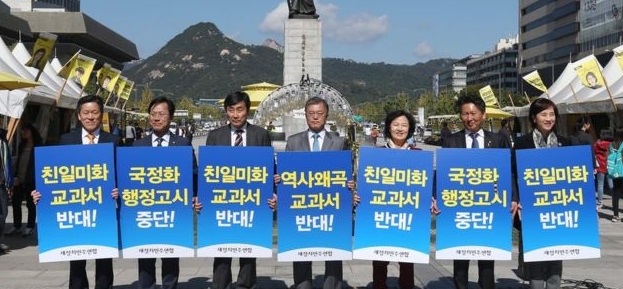SABRINA VERDUZCO WRITES – On Nov. 3rd, the South Korean government made the controversial, yet entirely legal decision to rewrite history textbooks. Many scholars and political opponents of the Park administration immediately condemned this move.
Two weeks later , 70,000 protesters congregated in Seoul in an attempt to confront the South Korean government’s move to censor middle and high school textbooks, a disturbing development expected to be implemented within the following year. Further evidence of the aggressive opposition to President Park Geun-hye’s leadership was seen as protesters demanded that Park step down.
, 70,000 protesters congregated in Seoul in an attempt to confront the South Korean government’s move to censor middle and high school textbooks, a disturbing development expected to be implemented within the following year. Further evidence of the aggressive opposition to President Park Geun-hye’s leadership was seen as protesters demanded that Park step down.
Now, it seems that the South Korean media has significantly reduced its coverage of the brutal police tactics during the protests. According to an anonymous source, “…the police are firing water cannons with Capsaicin.” The use of pepper sprays demonstrates an increasingly hostility that risks leading to an abandoned state of democracy. This public display certainly contradicts the country’s desire to be seen as the “democratic” Korea in relation to its northern counterpart.
Many historians worry that the new textbooks’ censorship of some of the rough spots in the country’s past will overlook complex details of modern South Korean history. According to the Washington Post, many think that the president’s major underlying motive for rewriting textbooks is an attempt to display her father, slain military dictator Park Chung-hee, in a more positive light. Her father’s legacy encompasses an era of a flourishing economy in the 1960’s and 70’s that was also plagued by records of severe oppression – especially of university students.
A famous quote from late philosopher Walter Benjamin states “History is written by the victors.” For South Korea, this rings true as future educational textbooks will seek to tone down the depiction of atrocities that don’t exactly compliment the winners’ hero image and political messages they seek to convey with their victories.
No wonder, according to the New York Times, that the National Institute of Korean History has decided to conceal the names of the authors of the new textbooks. This limitation facilitates the presence of one-sided ideologies if the authors are chosen based on biased criterion.
However, it is important to note that although the government makes less-than-democratic decisions at times, the citizens remain adept at differentiating between what is just/progressive and what is not. This is evident in a Gallup Korea poll that shows 53% opposed the change. Too bad that percentage is so disturbingly close to 50-50.

